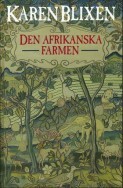You need to sign in or sign up before continuing.
Take a photo of a barcode or cover
slow-paced
Read the first sentence and enjoy the imagery, the sound of the words, then I dare you to put it down. It's not the movie. It is so much better.
“What ups and downs, as terrible as those of the man in the story. What is to come out of all this?”
Baroness Blixen's Out of Africa is a unique memoir that is highly evocative about the author's experiences living in Kenya during the early 20th century. From the time she began living in Kenya in 1914 until the time she was forced to sell her coffee plantation in 1931 and subsequent years thereafter, her heart belonged to Africa. Her writing style is poetic and descriptive, evoking the beauty of the Kenyan landscape and the wild animals that roam it. Simultaneously, it’s also a portrayal of colonialism in Africa and while not fully acknowledging the negative effects of colonialism, it’s beautiful prose nonetheless.
Baroness Blixen's book is divided into a series of vignettes, each focusing on a different aspect of her life in Kenya. She describes her relationships with the local Kikuyu people, as well as her interactions with the European settlers who also live in the area, most of them are her fellow Scandinavians. Her prose is often vivid and lyrical, painting a picture of a land that is both beautiful and dangerous. She writes about the thrill of hunting lions, the beauty of Ngong Hills, and the serenity of the African night sky.
At the same time, however, Baroness Blixen's portrayal of the Kikuyu people seems to be perpetuating the "noble savage" stereotype. Although she clearly has a deep respect for the Kikuyu and admires their culture and traditions, her description of them is often romanticised and idealised, which I gather might at times not reflect the real situation of the local people. For example, she writes that the Kikuyu are "the happiest people on earth," a claim that seems both simplistic and condescending while noting some aspects of the Kikuyu’s life that seems to be unaffected by the passing of time when viewed against the backdrop of the Europeans who had always been “chased by their clocks and watches”. Her understanding of the locals seems to be based on contrasts between “their people vs my people”, yet simultaneously she acknowledges the impossibility of fully understanding the Natives based on a European frame of reference.
Out of Africa is a complex and nuanced work that offers both beauty and insight. While its portrayal of colonialism and idealised view of the Kikuyu people are quite imbalanced seen from a modern perspective of the post-colonial lens, it is also a masterpiece of prose that captures the essence of life in Kenya during the early 20th century. Baroness Blixen's memoir is an essential piece of literature that should be read with a critical eye, but it is also a book that is sure to captivate and inspire readers with its beauty and wisdom.
Baroness Blixen's book is divided into a series of vignettes, each focusing on a different aspect of her life in Kenya. She describes her relationships with the local Kikuyu people, as well as her interactions with the European settlers who also live in the area, most of them are her fellow Scandinavians. Her prose is often vivid and lyrical, painting a picture of a land that is both beautiful and dangerous. She writes about the thrill of hunting lions, the beauty of Ngong Hills, and the serenity of the African night sky.
At the same time, however, Baroness Blixen's portrayal of the Kikuyu people seems to be perpetuating the "noble savage" stereotype. Although she clearly has a deep respect for the Kikuyu and admires their culture and traditions, her description of them is often romanticised and idealised, which I gather might at times not reflect the real situation of the local people. For example, she writes that the Kikuyu are "the happiest people on earth," a claim that seems both simplistic and condescending while noting some aspects of the Kikuyu’s life that seems to be unaffected by the passing of time when viewed against the backdrop of the Europeans who had always been “chased by their clocks and watches”. Her understanding of the locals seems to be based on contrasts between “their people vs my people”, yet simultaneously she acknowledges the impossibility of fully understanding the Natives based on a European frame of reference.
Out of Africa is a complex and nuanced work that offers both beauty and insight. While its portrayal of colonialism and idealised view of the Kikuyu people are quite imbalanced seen from a modern perspective of the post-colonial lens, it is also a masterpiece of prose that captures the essence of life in Kenya during the early 20th century. Baroness Blixen's memoir is an essential piece of literature that should be read with a critical eye, but it is also a book that is sure to captivate and inspire readers with its beauty and wisdom.
I would put this memoir on a feminist reading list. She’s not a great literary writer but her stories are clean and crisp. As expected there’s more to the story than what the movie depicts.
If you have an interest in anthropology, there are plenty of cultural depictions throughout.
If you have an interest in anthropology, there are plenty of cultural depictions throughout.
Kenya a hundred years ago. An old-style colony of Europeans owning huge farms and plantations. Hunting, growing coffee, visiting and hosting, taking care of the Masai and Kikuyu, dealing with the roaming Somalis. A very different world.
Apesar da péssima tradução é um excelente exemplar daquilo que são Narrativas de Viagens. Karen Blixen consegue através das suas descrições detalhadas transportar-nos para África em meados do século XX. Apesar de extenso e bastante descritivo é um livro leve e de leitura corrida.
Somos levados numa viagem até uma África simples e complexa. Uma viagem sensorial e quente onde a vida, a morte, o destino, a dor e a magia interligam-se profundamente.
Não posso afirmar que este livro deixou marcas visíveis em mim, contudo é um livro que vale a pena ler pelas suas descrições e paisagens. É, então, uma boa ilustração de como uma escrita verosímil e recheada de imagens nos faz viajar.
Somos levados numa viagem até uma África simples e complexa. Uma viagem sensorial e quente onde a vida, a morte, o destino, a dor e a magia interligam-se profundamente.
Não posso afirmar que este livro deixou marcas visíveis em mim, contudo é um livro que vale a pena ler pelas suas descrições e paisagens. É, então, uma boa ilustração de como uma escrita verosímil e recheada de imagens nos faz viajar.
adventurous
emotional
reflective
slow-paced
Out of Africa is a book that I read during my university year. At that time, I do not really understand it. I did not watch the movie either. Many people told me that this is classic. Even my professor.
I remember vaguely about the story. I think it is about a woman who single handle y, took over a farm and finding herself at the end. Some romance and some adventure.
I remember vaguely about the story. I think it is about a woman who single handle y, took over a farm and finding herself at the end. Some romance and some adventure.
adventurous
reflective
slow-paced
Svårt att veta vad man ska känna för den. Den är otroligt välskriven och absolut bra läsning i sig själv. Men det är också en så tydlig kolonialistfantasi att det är svårt att omfamna den helhjärtat.





